Caroline Leavitt's Blog, page 4
April 6, 2021
From the Nothing is Cancelled Virtual Book Tour: Paul Waters talks about Northern Ireland, writing, being from Belfast and his new novel, Blackwatertown
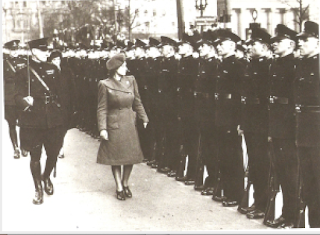 The author's great uncle Mike (RUC District Inspector Michael Murphy) escorting Princess (now Queen) Elizabeth in Belfast city centre in the 1940s. @font-face {font-family:"Cambria Math"; panose-1:2 4 5 3 5 4 6 3 2 4; mso-font-charset:0; mso-generic-font-family:roman; mso-font-pitch:variable; mso-font-signature:-536870145 1107305727 0 0 415 0;}@font-face {font-family:Calibri; panose-1:2 15 5 2 2 2 4 3 2 4; mso-font-charset:0; mso-generic-font-family:swiss; mso-font-pitch:variable; mso-font-signature:-536859905 -1073732485 9 0 511 0;}p.MsoNormal, li.MsoNormal, div.MsoNormal {mso-style-unhide:no; mso-style-qformat:yes; mso-style-parent:""; margin-top:0in; margin-right:0in; margin-bottom:8.0pt; margin-left:0in; line-height:107%; mso-pagination:widow-orphan; font-size:11.0pt; font-family:"Calibri",sans-serif; mso-ascii-font-family:Calibri; mso-ascii-theme-font:minor-latin; mso-fareast-font-family:Calibri; mso-fareast-theme-font:minor-latin; mso-hansi-font-family:Calibri; mso-hansi-theme-font:minor-latin; mso-bidi-font-family:"Times New Roman"; mso-bidi-theme-font:minor-bidi; mso-ansi-language:EN-GB;}.MsoChpDefault {mso-style-type:export-only; mso-default-props:yes; font-size:11.0pt; mso-ansi-font-size:11.0pt; mso-bidi-font-size:11.0pt; font-family:"Calibri",sans-serif; mso-ascii-font-family:Calibri; mso-ascii-theme-font:minor-latin; mso-fareast-font-family:Calibri; mso-fareast-theme-font:minor-latin; mso-hansi-font-family:Calibri; mso-hansi-theme-font:minor-latin; mso-bidi-font-family:"Times New Roman"; mso-bidi-theme-font:minor-bidi; mso-ansi-language:EN-GB;}.MsoPapDefault {mso-style-type:export-only; margin-bottom:8.0pt; line-height:107%;}div.WordSection1 {page:WordSection1;}
The author's great uncle Mike (RUC District Inspector Michael Murphy) escorting Princess (now Queen) Elizabeth in Belfast city centre in the 1940s. @font-face {font-family:"Cambria Math"; panose-1:2 4 5 3 5 4 6 3 2 4; mso-font-charset:0; mso-generic-font-family:roman; mso-font-pitch:variable; mso-font-signature:-536870145 1107305727 0 0 415 0;}@font-face {font-family:Calibri; panose-1:2 15 5 2 2 2 4 3 2 4; mso-font-charset:0; mso-generic-font-family:swiss; mso-font-pitch:variable; mso-font-signature:-536859905 -1073732485 9 0 511 0;}p.MsoNormal, li.MsoNormal, div.MsoNormal {mso-style-unhide:no; mso-style-qformat:yes; mso-style-parent:""; margin-top:0in; margin-right:0in; margin-bottom:8.0pt; margin-left:0in; line-height:107%; mso-pagination:widow-orphan; font-size:11.0pt; font-family:"Calibri",sans-serif; mso-ascii-font-family:Calibri; mso-ascii-theme-font:minor-latin; mso-fareast-font-family:Calibri; mso-fareast-theme-font:minor-latin; mso-hansi-font-family:Calibri; mso-hansi-theme-font:minor-latin; mso-bidi-font-family:"Times New Roman"; mso-bidi-theme-font:minor-bidi; mso-ansi-language:EN-GB;}.MsoChpDefault {mso-style-type:export-only; mso-default-props:yes; font-size:11.0pt; mso-ansi-font-size:11.0pt; mso-bidi-font-size:11.0pt; font-family:"Calibri",sans-serif; mso-ascii-font-family:Calibri; mso-ascii-theme-font:minor-latin; mso-fareast-font-family:Calibri; mso-fareast-theme-font:minor-latin; mso-hansi-font-family:Calibri; mso-hansi-theme-font:minor-latin; mso-bidi-font-family:"Times New Roman"; mso-bidi-theme-font:minor-bidi; mso-ansi-language:EN-GB;}.MsoPapDefault {mso-style-type:export-only; margin-bottom:8.0pt; line-height:107%;}div.WordSection1 {page:WordSection1;}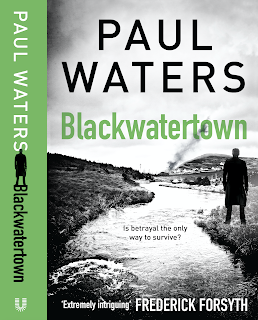 THE novel! Buy it now!
THE novel! Buy it now!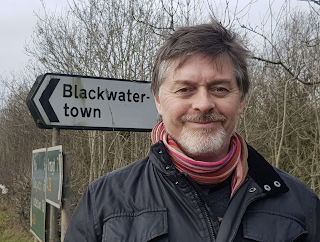 Portrait of the author in the real bBackwatertown
Portrait of the author in the real bBackwatertown
Ah, yes, the Nothing is Cancelled Virtual Book Tour still exists! (Though most of my energy is now at A Mighty Blaze.) Here we are honored to host Paul Waters, author, journalist and broadcaster (check him out at www.paulwatersauthor.com) talking about his new book Blackwatertown, about betrayal, family secrets and Northern Ireland. And it's wonderful. Thank you so much for being here, Paul! And for writing such a great essay here below!
What was haunting me as I wrote Blackwatertown, a crime thriller set on the 1950s Irish border, were the generations of secret policemen stretching back in my family history. They’re the inspiration for the book.
It’s not that they worked in espionage. They weren’t spies. It’s more that we never ever talked about it. It wasn’t safe. Growing up during the Northern Ireland “Troubles”, you learned to govern your tongue. And no wonder, when you consider what some in the family did: escorted royalty (that’s my sword-wielding great uncle Mike with the then Princess Elizabeth in Belfast), faked ambushes, arrested a Prime Minister, and covertly invaded the Republic of Ireland – though to be fair, that last one was an accident.
They were police before and after, north and south of the Irish border. But it was a forbidden topic of conversation - because loose lips can lead to a mercury tilt switch wired to explosives being hidden under your car overnight.
We were Catholics. And being Catholic in the overwhelmingly Protestant Royal Ulster Constabulary added layers of complication. Catholics in general often felt alienated from what sometimes seemed to be an oppressive and discriminatory police force, especially when the political conflict turned violent. Meanwhile, Protestant officers sometimes felt suspicious of their few Catholic colleagues – a potential enemy within. Which made my own family members in the RUC very careful. Though the fraternity of being officers on the frontline together could outweigh the differences.
We kept a lot under wraps back then. School uniforms, for instance. My father would never start his car until every inch of uniform worn by his young passengers was covered up with long black coats. The regular route to school passed through a Protestant district of Belfast, where visible Catholicism might be spotted and noted, along with the car license plate.
Overall, we got off very lightly compared to others. When things did occur, as they did to many families, the trick was to never talk about it. Feign confusion. Be vague. Had it even happened at all? Occasionally the signs were as hard to miss as bomb damage.
Looking back now, I wonder how many were really fooled by our performance? But the “whatever you say, say nothing” lesson was firmly imprinted on me.
Which is one reason writing fiction did not come early or easily. As a BBC TV and radio reporter I’ve helped many other people tell their stories to the world. Not a problem – rather a privilege, a joy and sometimes a duty. But writing fiction reveals self. Opening up makes you vulnerable. And not just in the please-like-me/like-my-writing way.
That may be why I set my book Blackwatertown in the 1950s. It’s fiction, but draws upon real stories not recorded in the history books or reported in newspapers. Can anyone seriously still be angry or feel personally threatened by allusion to lawbreaking by the law enforcers so many years later? It turns out that the answers are yes, and yes. Maybe I should have tracked back another hundred years to be on the safe side?
The ‘50s feel like a forgotten time in Northern Ireland. BTV – Before TV. The 1950s were eclipsed by the assertiveness and noise and horror of the decades that followed. I’ve been gripped for years by the writing of Eoin McNamee and Maurice Leitch, who pick their way through the dreamworld before “the Troubles”. And I wanted to tell other tales from back then, that reflected the experiences of the family stories that haunted my imagination. They were too good to let be forgotten.
Inconvenient truths and misfits make good stories. Catholics in the RUC fit into both categories. Simultaneously not to be trusted in the most menial employment, (according to a Northern Ireland Prime Minister), while deemed to have the right stuff to escort a visiting king or princess. Or more relevantly, be shot at defending the state that deemed them inherently inferior.
My protagonist, Jolly Macken, is a Catholic police sergeant, demoted and banished to the sleepy border village of Blackwatertown after inadvertently surfing a long rock down a mountain into Northern Ireland’s loudest Lambeg drum and scattering an Orange march. RIP drum and exile for Macken. He’d rather be left alone to walk the Mourne mountains and fish for dollaghan. But over the course of a week in Blackwatertown he uncovers dark family secrets, falls in love, accidentally starts a war, and is hailed a hero and branded a traitor. There’s also the small matter of finding who killed his brother, even if that killer is a fellow officer. When Blackwatertown explodes into violence, who can Macken trust? And is betrayal the only way to survive?
It’s not all grim. Gallows humour is the funniest. Laughs can feel more liberating than the liberation struggle. Sicilian author Andrea Camilleri taught me that accidental nakedness perks up everyone.
But how did these stories, real and imagined, get their hooks into me as a child, when everyone around me was so secretive and close-lipped?
Somebody blabbed. Somebody always does.
Shout out another author:
I’m from Belfast. Thirty miles south is the small coastal town of Dundrum, home to author and guitarist Gerard Brennan. His latest book, Shot, is the start of a cool new contemporary crime fiction series set in Northern Ireland, featuring Detective Sergeant Shannon McNulty.
Shout out an indie bookstore:
If you’re ever in Belfast, you should visit the iconic and hospitable No Alibis Bookshop on Botanic Avenue. It’s Northern Ireland’s cultural hub and a magnet for writers from all over the world. The owner, David Torrans, was immortalised in Colin Bateman’s Mystery Man thriller. David claims he bears no resemblance to his fictional counterpart, but we know better. He also makes a decent cup of tea and has an online/mail order service for the latest in Irish crime, thrillers and mysteries.
@font-face {font-family:"Cambria Math"; panose-1:2 4 5 3 5 4 6 3 2 4; mso-font-charset:0; mso-generic-font-family:roman; mso-font-pitch:variable; mso-font-signature:-536870145 1107305727 0 0 415 0;}@font-face {font-family:Calibri; panose-1:2 15 5 2 2 2 4 3 2 4; mso-font-charset:0; mso-generic-font-family:swiss; mso-font-pitch:variable; mso-font-signature:-536859905 -1073732485 9 0 511 0;}p.MsoNormal, li.MsoNormal, div.MsoNormal {mso-style-unhide:no; mso-style-qformat:yes; mso-style-parent:""; margin-top:0in; margin-right:0in; margin-bottom:8.0pt; margin-left:0in; line-height:107%; mso-pagination:widow-orphan; font-size:11.0pt; font-family:"Calibri",sans-serif; mso-ascii-font-family:Calibri; mso-ascii-theme-font:minor-latin; mso-fareast-font-family:Calibri; mso-fareast-theme-font:minor-latin; mso-hansi-font-family:Calibri; mso-hansi-theme-font:minor-latin; mso-bidi-font-family:"Times New Roman"; mso-bidi-theme-font:minor-bidi; mso-ansi-language:EN-GB;}.MsoChpDefault {mso-style-type:export-only; mso-default-props:yes; font-size:11.0pt; mso-ansi-font-size:11.0pt; mso-bidi-font-size:11.0pt; font-family:"Calibri",sans-serif; mso-ascii-font-family:Calibri; mso-ascii-theme-font:minor-latin; mso-fareast-font-family:Calibri; mso-fareast-theme-font:minor-latin; mso-hansi-font-family:Calibri; mso-hansi-theme-font:minor-latin; mso-bidi-font-family:"Times New Roman"; mso-bidi-theme-font:minor-bidi; mso-ansi-language:EN-GB;}.MsoPapDefault {mso-style-type:export-only; margin-bottom:8.0pt; line-height:107%;}div.WordSection1 {page:WordSection1;}
March 29, 2021
A Preview of coming attractions! Enjoy this conversation with the fabulous Anne Lamott here, and then come to the A Mighty Blaze Facebook Page, Friday at 4 ET, where I will be live interviewing her!
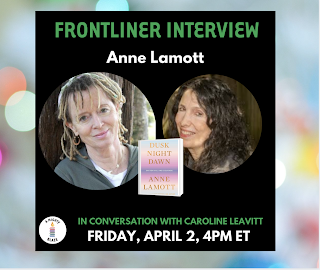
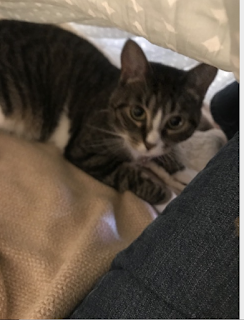
Who doesn't adore Annie Lamott? She's the one who taught us to write (Bird by Bird), how to raise our kids (Operating Instructions), and how to find the goodness and spirituality in all of us. Her latest book Dusk Night Dawn is an astonishing vitamin for the way we live now, a way to come back from the horrors of the Pandemic, the horrors of the Trump years, too.
I am thrilled to be live interviewing Anne on A Mighty Blaze this Friday at 4 ET. Just come to the FB page and you can be a part of it, and even ask Anne questions!
Thank you for this, Annie. Big love.
Dusk Night Dawn is so powerful and so healing to read, and I think because it is so honest about things like forgiveness, hope, dread. Are there moments when you are writing where you feel, uh oh, I can’t be that honest, and then you talk yourself done and you say what you need to?
—I really save the deeply intimate stories and details of my life for a few friends and the random husband and son. The stories in my book are about universal truths and problems—ie that most of us have equal proportions of self-doubt and grandiosity, of faith and fear; that loneliness is part of the human condition, that we have all screwed up right and left. What does happen is that Neal or my editor will gently suggest that something I’ve written will be misunderstood, or seen as downright antisocial or just gross.
You’ve always written gorgeous prose, but the writing in Dusk Night Dawn is even richer. How did that come about? And is it still true that you will never write another novel?
—Thank you! I think this book is a little more mystical, because it is so much about finding our center, our soul, when things are incredibly hard, both in the nation and at the dinner table, or awake in the middle of the night (the Swedes call 3:00 a.m. “the hour of the black dogs.”) And soul material doesn’t lend itself to intellectual erudition, so I needed to do the deep-dive towards the inside kiosk of the soul, where we are friendly awareness and fascination—so I’m glad if this heart and soul stuff was lucid!
So much of Dusk Night Dawn is about your wonderful later in life marriage. (I always believe the best things come later. Spoke as a woman who had her first and only child in her 40s!) Do you think you would have been open to a relationship like this early on or that you had to become the person you are now to have it?
—I definitely had a lot of healing to do before I could be available for a rich, safe relationship. I had to get over my addiction to people-pleasing. Also, I remember about five years ago I was overwhelmed with trying to save and fix other people, making their well-being my priority, and feeling taking advantage of because I was *nobody’s* priority. I got furious and grief struck by it one day, and went for a drive in the country where I shouted and cried in the car. Then I pulled over, picked up the 200 pound cell phone, and called my spiritual adviser of 30 years, Horrible Bonnie and shared with her—the rage and sorrow. She said, “Hooray! This is what we paid for! Get it out!” And then she said, “You need to make yourself your own priority, before you’ll be anybody else’s.” So I did, and a few months later, met Neal. And now we are each other’s priorities!
What I loved in the book was how hilarious it was—the way you deal with people who I would probably snap at—including many conservatives, since many conservatives are deeply religious. So I wanted to know how you do this?
—Sweet of you to say, but most of the time, it all becomes hilarious a little while later. At the time, I might have just lost my mind, but eventually, and usually when I see my own part in the misery or hostilities, I get my sense of humor back. Then I’m halfway home. Laughter truly is carbonated holiness.
You write so beautifully about an unbeautiful topic: dread. I’m asking for a friend—ha ha no I’m not—but how do you stop being afraid about the future because sometimes this friend-ha ha—gets so worked up –they think when is this life going to be over so they don’t have to worry anymore?
—Neal has really helped me with dread. He has a website (and forthcoming book) called shapes of truth.com, where he helps people with their inner critic, which he calls the super-ego, and I call my governess Dread growing up. He helped me identify when she is at the helm—when I was scaring myself and feeling small. He helped me quiet her down so she didn’t drive my life. She kept me alive when I was small—so I didn’t run into the street, or swim in the deep end. But now I can thank her, and ask her—Dread, my governess, the super ego—to hang out in the library and do some deep research for me, while I do my life.
Rereading your book feels new! It’s like you reread a novel but you know, oh here is where the girl jumps off her house. But your book--rereading is like getting out your favorite warm blanket and suddenly realizing that it is glinting with real gold threads you never noticed before. Do you reread your own work? Do you find something new in it every time?
—I’ve been reading it because I’ve been on virtual book tour for a month, doing readings and podcasts. Sometimes I’m kind of surprised that I thought of a good sentence or passage, or yeah, I’ll notice something for the first time, that I either TOTALLY wish my editor had made me take out because it is so lame, or that’s kind of cool! And I NEVER listen to my audio books for podcasts, because when Sam was 10, and I was on Rosie O’Donnell’s show, he asked me very gently if I had a speech impediment.
What’s obsessing you now and why?
—I’m obsessed with helping uphold voting rights! I send off money to anyone Stacy Abrams tells me to, and I’ll start writing postcards for the midterms in a few more months. Also, this is very petty, but I’ve been a little obsessed about the Covid Ten. This morning I was sitting up in bed, with my iPad on my lap, and my little tummy roll actually crept over to the iPad and started typing. Hank you and love you, Caroline. See you Friday!
@font-face {font-family:"Cambria Math"; panose-1:2 4 5 3 5 4 6 3 2 4; mso-font-charset:0; mso-generic-font-family:roman; mso-font-pitch:variable; mso-font-signature:-536870145 1107305727 0 0 415 0;}@font-face {font-family:"Arial Unicode MS"; panose-1:2 11 6 4 2 2 2 2 2 4; mso-font-charset:128; mso-generic-font-family:swiss; mso-font-pitch:variable; mso-font-signature:-134238209 -371195905 63 0 4129279 0;}@font-face {font-family:"Helvetica Neue"; panose-1:2 0 5 3 0 0 0 2 0 4; mso-font-alt:"Helvetica Neue"; mso-font-charset:0; mso-generic-font-family:auto; mso-font-pitch:variable; mso-font-signature:-452984065 1342208475 16 0 1 0;}@font-face {font-family:"\@Arial Unicode MS"; panose-1:2 11 6 4 2 2 2 2 2 4; mso-font-charset:128; mso-generic-font-family:swiss; mso-font-pitch:variable; mso-font-signature:-134238209 -371195905 63 0 4129279 0;}p.MsoNormal, li.MsoNormal, div.MsoNormal {mso-style-unhide:no; mso-style-qformat:yes; mso-style-parent:""; margin:0in; mso-pagination:widow-orphan; font-size:12.0pt; font-family:"Times New Roman",serif; mso-fareast-font-family:"Arial Unicode MS"; border:none;}p.Default, li.Default, div.Default {mso-style-name:Default; mso-style-unhide:no; mso-style-parent:""; margin-top:8.0pt; margin-right:0in; margin-bottom:0in; margin-left:0in; mso-pagination:widow-orphan; font-size:12.0pt; font-family:"Helvetica Neue"; mso-fareast-font-family:"Arial Unicode MS"; mso-bidi-font-family:"Arial Unicode MS"; color:black; border:none; mso-style-textoutline-type:none; mso-style-textoutline-outlinestyle-dpiwidth:0pt; mso-style-textoutline-outlinestyle-linecap:flat; mso-style-textoutline-outlinestyle-join:bevel; mso-style-textoutline-outlinestyle-pctmiterlimit:0%; mso-style-textoutline-outlinestyle-dash:solid; mso-style-textoutline-outlinestyle-align:center; mso-style-textoutline-outlinestyle-compound:simple;}.MsoChpDefault {mso-style-type:export-only; mso-default-props:yes; font-size:10.0pt; mso-ansi-font-size:10.0pt; mso-bidi-font-size:10.0pt; mso-fareast-font-family:"Arial Unicode MS"; border:none;}.MsoPapDefault {mso-style-type:export-only;}div.WordSection1 {page:WordSection1;}
March 21, 2021
A YA that celebrates science! Marti Leimbach talks about DRAGONFLY GIRL, a heroine who finds the cure for death and what was obsessing her in the writing.
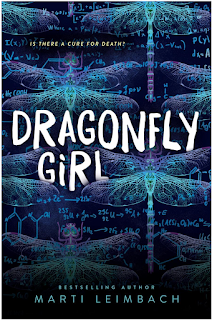
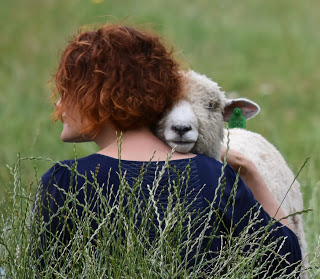
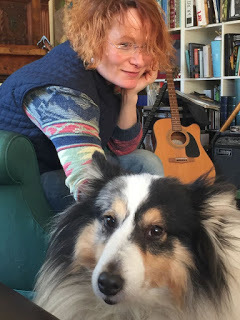
What is more exciting than a YA novel about science featuring a science-loving girl who has found the cure for death? Called a YA thriller for people who loved The Queen's Gambit (and who didn't, I ask you?) Dragonfly Girl makes the astonishing, the magical, seem possible. School Library Journal calls it "thrilling, with a heroine to root for."
I first heard about Marti Leimbach because she wrote the international bestseller, DYING YOUNG, which was made into a blockbuster movie. She's also the author of The Man From Saigon and Daniel Isn't Talking, and she is a core tutor at oxford University's creative writing program. Also, I would be amiss if I didn't mention RATS: Marti breeds them as part of the National Fancy Rat Society. But most importantly to me, Marti and I became friends and I adore her. Thank you so much, Marti for writing something for my Nothing is Cancelled Book Tour blog.
Visit her at www.martileimbach.co
What was haunting you in writing this book?
Like my 17-year old heroine, Kira, in Dragonfly Girl, I like reading science research papers. I worry a little that whatever medical treatment I learn about won’t arrive soon enough for me, or be affordable. So I read these papers with a mixture of hope and dread, certain that I or someone dear to me might die of something that, in the near future, will be totally treatable.
Still under the general heading of “haunting” let’s add my historical anxiety about poverty and lack of opportunity, which is also in the novel. My only parent, my mother, was very ill through my late teens and early twenties. At the time, I couldn’t imagine how I was meant to go to college, which would mean deserting her, when she very sick and destitute, needing someone to look after her or at least cheer her up. Kira has the same problem I did, though she handles it way better.
In my case, I went to college on a scholarship and I mostly abandoned my mother, which I regret. I visited when I could, hoping that was enough (it wasn’t) and that she’d get better (she didn’t). I felt worried about her when I was away, but suffered terrible angst when I was with her. My mother died just after I finished college and, really, I’ll never get over feeling like the worst daughter in the world for having left her.
So, I’ve got the medical FOMO, the guilt over the dying parent, a legacy of deep financial troubles and a sense that my life is just not normal. I’m not normal. Add it together, stir the pot, and you come up with Dragonfly Girl.
Dragonfly Girl is about an impoverished teenager with a gift for science, who discovers a “cure” for death. Such a triumph ought to be the means of securing her future and helping her mother, but she ends up at the center of an international rivalry. She goes from being an absolute nobody to being somebody considered very special. So special that it puts her in danger.
Which brings me to a final idea that occasionally haunts me: maybe being noticed isn’t always a good thing?
Has your writing process changed since you began? How?
Before I began Dragonfly Girl I was already thinking of the sequel that would follow. Important admission: nobody has paid me for this sequel or even discussed it. There’s no two-book contract, no conversation about the second book at all, in fact. All of which is to say that I may be the only person who insists that Dragonfly Girl is part of a series. If nobody wants the sequel, I may have to publish it myself. And I’d do that because Academy One is the best book I’ve ever written. It’s going into print even if I have to grow the trees to make the paper on which it is printed.
Writing a book with a sequel in mind changed everything about my process. I don’t plot things out, so once Dragonfly Girl was finished I had to race through a draft of Academy One, so that I could then go back to Dragonfly Girl and revise it so the two were in sync.
Understand that I’m only describingthis process, not recommending it. If you’re not into plotting out novels ahead of time, creating a series is a near-impossible undertaking. And I now have newfound respect, bordering on hero-worship, for every author with a good series.
What's obsessing you now and why?
Due to my ongoing and necessary isolation due to Covid, I’m a little concerned I’m edging toward insanity. So there’s that. In terms of writing, this may be a good thing. Novels are easier for those of us who catastrophize – that is, start with one problem and imagine the worst possible likely event to follow – so I’m looking forward to a good creative run.
What question didn't I ask that I should have?
Maybe why I’m writing young adult novels? Admittedly, I don’t think of Dragonfly Girl or Academy One, as exclusively young adult novels. It’s just that the stories involve young people.
Teenagers and people in their twenties have an energy I crave. Writing about them helps me embody that energy, at least for a time. I can’t get enough of it. I feel younger when I write and read (good) YA. I feel my thinking become more flexible, expansive, with the excitement of possibility that defines our teens and early adulthood.
OH AND: so much of your book is about the mystery of death--lately scientists are saying that we can cure death, as if it is a disease. What do you think?
Well, we’re always trying to cure death, though usually before it happens. We slow down or reverse the disease process.
Interestingly, we’ve already had to redefine what “dead” even means. Death used to be understood as the cessation of a heartbeat, for example. However, as we can now reverse that condition through technology, a lack of heartbeat no longer suffices as the definition of death.
What happens in Dragonfly Girl is that the heroine comes up with the reversal of an additional process in dying: the rapid destruction of brain cells. That isn’t to say that it restores the body to full health, but that this particular process in dying is arrested and sometimes reversed.
Could this happen in real life? Sure. Though not yet and not necessarily as described in the novel.
@font-face {font-family:"Cambria Math"; panose-1:2 4 5 3 5 4 6 3 2 4; mso-font-charset:0; mso-generic-font-family:roman; mso-font-pitch:variable; mso-font-signature:-536870145 1107305727 0 0 415 0;}@font-face {font-family:DengXian; panose-1:2 1 6 0 3 1 1 1 1 1; mso-font-alt:等线; mso-font-charset:134; mso-generic-font-family:auto; mso-font-pitch:variable; mso-font-signature:-1610612033 953122042 22 0 262159 0;}@font-face {font-family:Calibri; panose-1:2 15 5 2 2 2 4 3 2 4; mso-font-alt:Calibri; mso-font-charset:0; mso-generic-font-family:swiss; mso-font-pitch:variable; mso-font-signature:-536859905 -1073732485 9 0 511 0;}@font-face {font-family:"Segoe UI"; panose-1:2 11 6 4 2 2 2 2 2 4; mso-font-charset:0; mso-generic-font-family:swiss; mso-font-pitch:variable; mso-font-signature:-469750017 -1073683329 9 0 511 0;}@font-face {font-family:"\@DengXian"; panose-1:2 1 6 0 3 1 1 1 1 1; mso-font-charset:134; mso-generic-font-family:auto; mso-font-pitch:variable; mso-font-signature:-1610612033 953122042 22 0 262159 0;}p.MsoNormal, li.MsoNormal, div.MsoNormal {mso-style-unhide:no; mso-style-qformat:yes; mso-style-parent:""; margin:0in; mso-pagination:widow-orphan; font-size:12.0pt; font-family:"Calibri",sans-serif; mso-ascii-font-family:Calibri; mso-ascii-theme-font:minor-latin; mso-fareast-font-family:DengXian; mso-fareast-theme-font:minor-fareast; mso-hansi-font-family:Calibri; mso-hansi-theme-font:minor-latin; mso-bidi-font-family:Arial; mso-bidi-theme-font:minor-bidi; mso-ansi-language:EN-GB; mso-fareast-language:ZH-CN;}.MsoChpDefault {mso-style-type:export-only; mso-default-props:yes; font-family:"Calibri",sans-serif; mso-ascii-font-family:Calibri; mso-ascii-theme-font:minor-latin; mso-fareast-font-family:DengXian; mso-fareast-theme-font:minor-fareast; mso-hansi-font-family:Calibri; mso-hansi-theme-font:minor-latin; mso-bidi-font-family:Arial; mso-bidi-theme-font:minor-bidi; mso-ansi-language:EN-GB; mso-fareast-language:ZH-CN;}div.WordSection1 {page:WordSection1;}
March 2, 2021
"A moose walks into a town and..." Marcia Butler talks about her incandescent new novel OSLO, MAINE, Santa Fe living, memory, being haunted and so much more
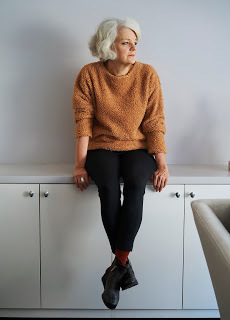
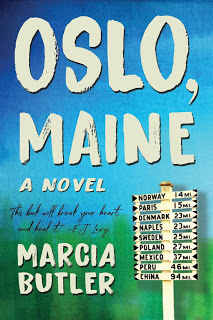
I first became friends with Marcia Butler when she published her ravishing memoir, THE SKIN ABOVE MY KNEE. I loved it so much I promoted it, and we became fast friends. I had the honor of being in her brilliant documentary, THE CREATIVE IMPERATIVE, too! She's warm, funny and so, so smart that she virtually radiates fireworks! And she's got a brilliant new novel out, OSLOW, MAINE. Look at some of the praise:
“Butler’s characters are such complex, authentically flawed humans, you can’t help but root for them. But then there’s the moose…Butler’s moose is a moose, and we never lose that essential fact. It was a brilliant choice to open the novel in the moose’s perspective to immediately establish her stakes in the story… Oslo, Maine is an engaging, wonderfully nuanced novel.”
New York Journal of Books – Jaimee Colbert Wriston
“The fictional, titular town hosts a complicated page-turner of a story spurred by the fallout from a young boy’s violent run-in with a moose, and though the pacing is breezy, the grappling with interpersonal and interspecies relationships is not.”
Down East Magazine—Will Grunewald
“For all their furtiveness, the flawed but deeply relatable characters in Butler's second novel, exude an authentic sense of humanity, making this a sure-fire recommendation for Fredrik Backman (A Man Called Ove) fans.”
Booklist
A moose walks into a rural Maine town called Oslo. Pierre Roy, a brilliant twelve-year-old, loses his memory in an accident. Three families are changed for worse and better as they grapple with trauma, marriage, ambition, and their fraught relationship with the natural world.
Oslo, Maine is a character driven novel exploring class and economic disparity. It inspects the strengths and limitations of seven average yet extraordinary people as they reckon with their considerable collective failure around Pierre’s accident. Alliances unravel. Long held secrets are exposed. And throughout, the ever-present moose is the linchpin that drives this richly drawn story, filled with heartbreak and hope, to its unexpected conclusion.
Marcia Butler, a former professional oboist and recent documentary film maker, is the author of the memoir, The Skin Above My Knee, and debut novel Pickle’s Progress. With her second novel, Oslo, Maine, Marcia draws on indelible memories of performing for fifteen years at a chamber music festival in central Maine. While there, she came to love the people, the diverse topography, and especially the majestic and endlessly fascinating moose who roam, at their perpetual peril, among the humans. After many decades in New York City, Marcia now makes her home in Santa Fe, New Mexico.
Thank you so, so much, Marcia! I only wish I could hug you!
Caroline Leavitt: I always believe that writers are haunted into writing their stories. What was haunting you?
Marcia Butler: It’s such an interesting question because I’ve actually been thinking about this lately. When you write a novel you believe, perhaps naively, that the plot and the characters are made up—unless, of course, your novel is based on real-life events. But this can never be entirely true because all the words and ideas are coming from your brain which holds the entire experience of your life. I finished OSLO, MAINE over a year ago, which is typical for the publishing cycle. Now that it’s on bookstore shelves, I’m promoting it and talking about it. And, with the distance afforded by this year “off”, I’ve discovered that my life experiences havefiltered into OSLO. I wouldn’t call it haunting, exactly. More like issues I unconsciously needed to write about.
The most obvious example is my twelve-year-old violin prodigy character, Pierre Roy, who’s lost his memory due to an accident. He discovers that he can use the violin to ground himself. This activity, playing music, is his safe place. The fact that he can’t remember anything becomes, at least for that period of time, utterly unimportant. He is truly in the present, in the now. So, duh, that experience comes from me. When I was young, I used the oboe in exactly that way. Not about memory but with regard to the emotional pain I endured during a difficult childhood. All that sadness fell away for the hours I practiced. But even more than that, the specific sound of the oboe transported me to an imaginary interior life that was happier and which I controlled. This was particularly important because I couldn’t control anything that was happening in real life. I was good at music and no one could deny that fact. And man, I used that oboe for all it was worth. It saved my life, much the way the violin saves Pierre’s.
@font-face {font-family:"Cambria Math"; panose-1:2 4 5 3 5 4 6 3 2 4; mso-font-charset:0; mso-generic-font-family:roman; mso-font-pitch:variable; mso-font-signature:-536870145 1107305727 0 0 415 0;}@font-face {font-family:Calibri; panose-1:2 15 5 2 2 2 4 3 2 4; mso-font-charset:0; mso-generic-font-family:swiss; mso-font-pitch:variable; mso-font-signature:-536859905 -1073732485 9 0 511 0;}p.MsoNormal, li.MsoNormal, div.MsoNormal {mso-style-unhide:no; mso-style-qformat:yes; mso-style-parent:""; margin:0in; mso-pagination:widow-orphan; font-size:12.0pt; font-family:"Calibri",sans-serif; mso-ascii-font-family:Calibri; mso-ascii-theme-font:minor-latin; mso-fareast-font-family:Calibri; mso-fareast-theme-font:minor-latin; mso-hansi-font-family:Calibri; mso-hansi-theme-font:minor-latin; mso-bidi-font-family:"Times New Roman"; mso-bidi-theme-font:minor-bidi;}p.MsoPlainText, li.MsoPlainText, div.MsoPlainText {mso-style-priority:99; mso-style-link:"Plain Text Char"; margin:0in; mso-pagination:widow-orphan; font-size:11.0pt; mso-bidi-font-size:10.5pt; font-family:"Calibri",sans-serif; mso-fareast-font-family:Calibri; mso-fareast-theme-font:minor-latin; mso-bidi-font-family:"Times New Roman"; mso-bidi-theme-font:minor-bidi;}span.PlainTextChar {mso-style-name:"Plain Text Char"; mso-style-priority:99; mso-style-unhide:no; mso-style-locked:yes; mso-style-link:"Plain Text"; mso-ansi-font-size:11.0pt; mso-bidi-font-size:10.5pt; font-family:"Calibri",sans-serif; mso-ascii-font-family:Calibri; mso-hansi-font-family:Calibri;}.MsoChpDefault {mso-style-type:export-only; mso-default-props:yes; font-family:"Calibri",sans-serif; mso-ascii-font-family:Calibri; mso-ascii-theme-font:minor-latin; mso-fareast-font-family:Calibri; mso-fareast-theme-font:minor-latin; mso-hansi-font-family:Calibri; mso-hansi-theme-font:minor-latin; mso-bidi-font-family:"Times New Roman"; mso-bidi-theme-font:minor-bidi;}div.WordSection1 {page:WordSection1;}
@font-face {font-family:"Cambria Math"; panose-1:2 4 5 3 5 4 6 3 2 4; mso-font-charset:0; mso-generic-font-family:roman; mso-font-pitch:variable; mso-font-signature:-536870145 1107305727 0 0 415 0;}@font-face {font-family:Calibri; panose-1:2 15 5 2 2 2 4 3 2 4; mso-font-charset:0; mso-generic-font-family:swiss; mso-font-pitch:variable; mso-font-signature:-536859905 -1073732485 9 0 511 0;}p.MsoNormal, li.MsoNormal, div.MsoNormal {mso-style-unhide:no; mso-style-qformat:yes; mso-style-parent:""; margin:0in; mso-pagination:widow-orphan; font-size:12.0pt; font-family:"Calibri",sans-serif; mso-ascii-font-family:Calibri; mso-ascii-theme-font:minor-latin; mso-fareast-font-family:Calibri; mso-fareast-theme-font:minor-latin; mso-hansi-font-family:Calibri; mso-hansi-theme-font:minor-latin; mso-bidi-font-family:"Times New Roman"; mso-bidi-theme-font:minor-bidi;}p.MsoPlainText, li.MsoPlainText, div.MsoPlainText {mso-style-priority:99; mso-style-link:"Plain Text Char"; margin:0in; mso-pagination:widow-orphan; font-size:11.0pt; mso-bidi-font-size:10.5pt; font-family:"Calibri",sans-serif; mso-fareast-font-family:Calibri; mso-fareast-theme-font:minor-latin; mso-bidi-font-family:"Times New Roman"; mso-bidi-theme-font:minor-bidi;}span.PlainTextChar {mso-style-name:"Plain Text Char"; mso-style-priority:99; mso-style-unhide:no; mso-style-locked:yes; mso-style-link:"Plain Text"; mso-ansi-font-size:11.0pt; mso-bidi-font-size:10.5pt; font-family:"Calibri",sans-serif; mso-ascii-font-family:Calibri; mso-hansi-font-family:Calibri;}.MsoChpDefault {mso-style-type:export-only; mso-default-props:yes; font-family:"Calibri",sans-serif; mso-ascii-font-family:Calibri; mso-ascii-theme-font:minor-latin; mso-fareast-font-family:Calibri; mso-fareast-theme-font:minor-latin; mso-hansi-font-family:Calibri; mso-hansi-theme-font:minor-latin; mso-bidi-font-family:"Times New Roman"; mso-bidi-theme-font:minor-bidi;}div.WordSection1 {page:WordSection1;}
@font-face {font-family:"Cambria Math"; panose-1:2 4 5 3 5 4 6 3 2 4; mso-font-charset:0; mso-generic-font-family:roman; mso-font-pitch:variable; mso-font-signature:-536870145 1107305727 0 0 415 0;}@font-face {font-family:Calibri; panose-1:2 15 5 2 2 2 4 3 2 4; mso-font-charset:0; mso-generic-font-family:swiss; mso-font-pitch:variable; mso-font-signature:-536859905 -1073732485 9 0 511 0;}p.MsoNormal, li.MsoNormal, div.MsoNormal {mso-style-unhide:no; mso-style-qformat:yes; mso-style-parent:""; margin:0in; mso-pagination:widow-orphan; font-size:12.0pt; font-family:"Calibri",sans-serif; mso-ascii-font-family:Calibri; mso-ascii-theme-font:minor-latin; mso-fareast-font-family:Calibri; mso-fareast-theme-font:minor-latin; mso-hansi-font-family:Calibri; mso-hansi-theme-font:minor-latin; mso-bidi-font-family:"Times New Roman"; mso-bidi-theme-font:minor-bidi;}.MsoChpDefault {mso-style-type:export-only; mso-default-props:yes; font-family:"Calibri",sans-serif; mso-ascii-font-family:Calibri; mso-ascii-theme-font:minor-latin; mso-fareast-font-family:Calibri; mso-fareast-theme-font:minor-latin; mso-hansi-font-family:Calibri; mso-hansi-theme-font:minor-latin; mso-bidi-font-family:"Times New Roman"; mso-bidi-theme-font:minor-bidi;}div.WordSection1 {page:WordSection1;}
CL: There's so much fascinating detail about memory in this novel. Did you research?
MB:Right, memory is definitely a theme. Pierre grapples with his memory loss and comes to the conclusion that fussing about the past and fretting the future is a fool’s game. This is juxtaposed with another character—a female moose—who also has a point of view. I imagine that memory is of little importance to a moose, because she begins each day trying to satisfy her needs just as she did the day before. And so, the moose and Pierre are alter-egos with regard to living in the moment. I confess, I didn’t research. But I relied on my experience as a professional musician. When you’re in the middle of playing a concert, past and future are irrelevant. You focus like mad. Music tends to do that. It compels performers to pay attention to what is happening right now. So that’s what I kept going back to—that suspended feeling I’d experienced so many times when performing concerts.
CL: You are the author of the critically acclaimed memoir, The Skin Above my Kneeand your debut novel Pickle's Progress. What was it like turning to fiction again? And which do you prefer?
MB:Well, let’s just say that It’s really, really hard exposing oneself in a memoir. Not only writing it, which can be wrenching, but also living with the aftermath. Because forevermore, everyone knows a certain narrative of my life. My secrets. My total failures. My occasional successes. My immense sadness. And weirdly, strangers think they know me too. I can almost see it in their eyes. The nodding of the head. “Oh yesssss, I read your memoir…” Cue: awkward silence. But a memoir isn’t a complete life; it’s a collection of true stories stitched together into a narrative arc that hopefully makes for a good read. I am so much more than all the stuff I wrote about in Skin. But truly, no regrets. This is all to say that I am, in my heart, a fiction writer. So, writing first Pickle and then Oslo was a given. And I’m already into my next work-in-progress!
CL: What's obsessing you now and why?
MB:Early Bette Davis movies. Dark Victory, The Letter, Voyager Now, Deception. Because she slithers around like a panther all the time. Ancient petroglyphs which are everywhere in New Mexico. They make me feel young(er). Speaking of wrinkles. My neck. See Nora Ephron. Um, my Apple ear buds. Does that count? Cause this is a love affair. Stacey Abrams— the star that just keeps on shining. Historian Heather Cox Richardson. Her newsletter is all I need with my morning coffee.
CL: What question didn't I ask that I should have?
MB:Maybe, what’s the best part of living in Santa Fe, New Mexico? Drive five miles out of Santa Fe in any direction and you’ll drop to your knees because the physical beauty is astonishing. You can see the last 10,000 years embedded into the sides of mountains. Talk about perspective!
@font-face {font-family:"Cambria Math"; panose-1:2 4 5 3 5 4 6 3 2 4; mso-font-charset:0; mso-generic-font-family:roman; mso-font-pitch:variable; mso-font-signature:-536870145 1107305727 0 0 415 0;}@font-face {font-family:Calibri; panose-1:2 15 5 2 2 2 4 3 2 4; mso-font-charset:0; mso-generic-font-family:swiss; mso-font-pitch:variable; mso-font-signature:-536859905 -1073732485 9 0 511 0;}p.MsoNormal, li.MsoNormal, div.MsoNormal {mso-style-unhide:no; mso-style-qformat:yes; mso-style-parent:""; margin:0in; mso-pagination:widow-orphan; font-size:12.0pt; font-family:"Calibri",sans-serif; mso-ascii-font-family:Calibri; mso-ascii-theme-font:minor-latin; mso-fareast-font-family:Calibri; mso-fareast-theme-font:minor-latin; mso-hansi-font-family:Calibri; mso-hansi-theme-font:minor-latin; mso-bidi-font-family:"Times New Roman"; mso-bidi-theme-font:minor-bidi;}.MsoChpDefault {mso-style-type:export-only; mso-default-props:yes; font-family:"Calibri",sans-serif; mso-ascii-font-family:Calibri; mso-ascii-theme-font:minor-latin; mso-fareast-font-family:Calibri; mso-fareast-theme-font:minor-latin; mso-hansi-font-family:Calibri; mso-hansi-theme-font:minor-latin; mso-bidi-font-family:"Times New Roman"; mso-bidi-theme-font:minor-bidi;}div.WordSection1 {page:WordSection1;}
February 19, 2021
More Big News from small presses: Tamra Bolton talks about The Art of Storykeeping: Saving One Family at a Time.
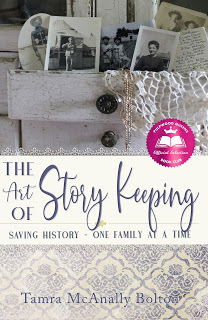
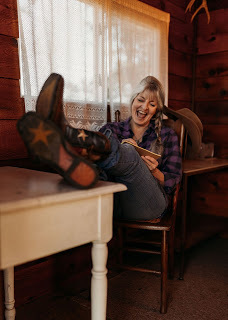
With thanks to Kathy Murphy, founder of the Pulpwood Queens for alerting me to these great books!
I always believe that writers are haunting into writing their books. What was haunting you? And did you feel, after finishing that you were unhaunted?
To answer this question, I'd have to back up to my first writing experiment - a collection of interviews I did over a two year period back in the early 2000s. I compiled these interviews of my dad's World War II unit into a book for the families of the men I interviewed. That whetted my appetite for digging up memories and stories and preserving history. I worked as a photojournalist from around 2007 to 2020 interviewing everyone from CEOs and celebrities to ranchers and chefs. This experience convinced me that everyone has a story...even those that think they don't. I became 'haunted', as you say, by the numerous 'if only's' I heard from those I talked to...most of them had regrets about not finding out more about their family history, not asking the questions that years later still haunted them. So, I guess you could say those regrets kept echoing in my own heart, as I realized there were many things I still didn't know about my own family and I determined to not let any more of those memories slip away.
In 2017, I wrote and co-illustrated with my husband a book about my childhood When I Was Small as a gift to my two grandchildren (at the time), to let them know what growing up was like for me. I was also working on a full-length book about my Dad and his life leading up to and through World War II and his experiences fighting the Battle of Iwo Jima - A Blessed Life: One World War II Seabee's Story. Finishing Dad's book satisfied that "haunting feeling" for a short while, but after the book was published, the feedback from so many prodded me to write my latest book The Art of Story Keeping - Saving History - One Family At A Time.
Over and over I heard the same sad statement from readers..."if only I had asked about ...but now, it's too late" or "my kids/grandkids don't know anything about my parents or my childhood, it just never came up...is it too late?". Statements like these kept me awake at night until I finished the book which gives a blueprint for recording/preserving those memories and stories for future generations. Research has proven that when people know where they are from and have shared family stories, they are more content and usually more accomplished in their day to day lives. Kids especially benefit from sharing stories. So, I've made it my mission, so to speak, to encourage people to start where they are...start sharing their stories and saving them because if we don't, those stories will be lost. We all need connection, especially now, and sharing our stories is a wonderful way to connect with those we may not be able to be with while dealing with this pandemic. I guess I will never be "unhaunted" because there are always more stories that need sharing...but what a wonderful way to spend my writing life!
What kind of writer are you? Do you plot things out or do you wait for the pesky muse?
Both! It depends on the project. I usually work from a loose outline or general idea, then add to it as I go. As far as my day to day writing, if I get stuck, I usually go on a walk and let things percolate for awhile. I wish I were more disciplined in my writing, but some days all I can get on paper (I write everything longhand first in spiral notebooks or yellow legal pads) is a snippet of character conversation, a descriptive paragraph, I don't beat myself up if I don't accomplish much in a day. I think it scares my muse away if I get too anxious. On days when everything flows and life doesn't interfere too much, I can get a lot done, but that doesn't happen often enough. On weekends, if I am undisturbed, I can get as many as 10,000 words down...maybe not all usable, but they are on paper nonetheless.
What one thing do you want readers to come away knowing after reading your book?
You matter. Your stories matter. You, your family are all part of this great big human experiment. There is no such thing as a nobody - we are all somebody - and we all need to share our own story, for our sake, our children's sake, and for the sake of history. We all complete part of the mosaic of life - don't leave your spot empty.
What's obsessing you now and why?
Besides cleaning out my storage closets, I guess it would be finishing well. As I get older I see more and more people, especially women, abandon their dreams and give up on who they once wanted to be. That frightens me and motivates me to encourage women to never give up on their dreams, especially as they get older. You may not be able to do exactly the things you dreamed about as a little girl, but you could possibly have a version of that dream if you are aware. You have to learn to see the possibilities and the promise in situations you have at the present. The answer to a dream may be right in front of you, but you have to be 'open' to see it. Life has a way of working things out if we are willing and patient. I feel everyone has a purpose to fulfill and I want to play my part until the end. My Dad has a saying, "If you're not living, you're dying." He has set a great example by making the most of everyday, even now, as he's working on his 98th year on this earth. Play your part, never give up, and strive to finish well. That is my mantra.
What question didn't I ask that I should have?
What are you working on now? A novel about the cross-over world between the earthly and the spiritual, due out in 2022. Also, I am working on a devotional book about my travels accompanied by my photography, another children's book, and a book of essays. I like to stay busy. :)
My belief is - if you really want something, you will work for it, make time for it, and make it happen. Hoping something will happen is good, but hope combined with action is unstoppable.
@font-face {font-family:"Cambria Math"; panose-1:2 4 5 3 5 4 6 3 2 4; mso-font-charset:0; mso-generic-font-family:roman; mso-font-pitch:variable; mso-font-signature:-536870145 1107305727 0 0 415 0;}@font-face {font-family:Calibri; panose-1:2 15 5 2 2 2 4 3 2 4; mso-font-charset:0; mso-generic-font-family:swiss; mso-font-pitch:variable; mso-font-signature:-536859905 -1073732485 9 0 511 0;}p.MsoNormal, li.MsoNormal, div.MsoNormal {mso-style-unhide:no; mso-style-qformat:yes; mso-style-parent:""; margin:0in; mso-pagination:widow-orphan; font-size:12.0pt; font-family:"Times New Roman",serif; mso-fareast-font-family:Calibri;}.MsoChpDefault {mso-style-type:export-only; mso-default-props:yes; mso-fareast-font-family:Calibri; mso-fareast-theme-font:minor-latin;}div.WordSection1 {page:WordSection1;}
Big ideas from a small publisher: Vince Spinnato talks about his memoir: My Pursuit of Beauty: A cosmetic Chemist Reveals the Glitz, The Glam and the Batsh*t Crazy
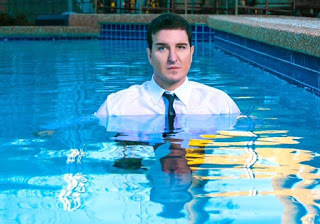
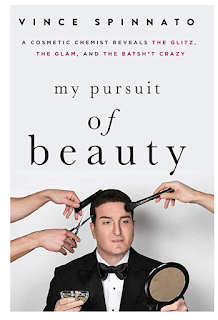
With thanks to Kathy Murphy, founder of the fabulous Pulpwood Queens!
Cosmetic chemist and “certified nose” Vince Spinnato began his career in the personal care, cosmetic and fine fragrance industries more than 25 years ago. As president and CEO of TurnKeyBeauty, Inc., VS Vincenzo Ltd., Inc., Aegean Skincare, LLC and Vincenzo Skincare, LLC, Spinnato has formulated and developed hundreds of products for skin and hair care, color cosmetics, bath &body and fine fragrances. His latest luxury product, Caviar &Diamonds, debuted in 2020 under the Vincenzo Skincare brand. Considered an expert in his field, Spinnato has been a contributor to Vogue, Vanity Fair, Harper’s Bazaar, W, Esquire, GQ, Whole Foods Magazine, Health News Digest, Riviera, and more. His memoir, My Pursuit of Beauty: A Cosmetic Chemist Reveals The Glitz, The Glam and The Batsh*t Crazy debuted on January 10, 2021. A documentary about his life will also be aired in 2021. Spinnato’s celebrity clients include Jennifer Lopez, Gwen Stefani, Khloe Kardashian, Lorna Luft, Carrie Underwood, Victoria Beckham, Seth MacFarlane, Jessica Simpson, Michael Jordon, Lindsay Lohan and others.
Thank you for being here, Vince!
I always feel that authors are somehow haunted into writing their books. What was haunting you about the story you wrote?
After being in therapy for about 30 years, I couldn’t stand hearing myself talk for another minute. In the middle of a session, I stood up and said, “I’m done!” My psychiatrist looked at me and said, “Why don’t you write a book?”
The next day, I got out my tape recorder and started talking. I decided that I wanted to use my crazy life story as a source of lifting people up. Seven years later, after it was transcribed, I realized that there was no way people would want to read it. Instead of giving it the old heave ho, I hired Mickey Goodman to be my ghost writer. It’s been a fun California/Georgia collaboration.
What kind of writer are you? Do you map things out or wait for the Muse?
Since I recorded my story, there was definitely no outline involved. I passed that fun job to Mickey! My only attempt at “order” was to name each chapter after the cars I drove during that period of my life. For instance, I drove a 1993 black BMW coupe from New Jersey to California at age 20 to launch my career. And because I thought that owning a fancy car gave the appearance of success, I immediately traded it for a 1995 3251 Mercedes convertible, then “downgraded” to a less expensive Mercedes. I fell so far behind in the payments that it was repo’d. So much for appearing rich and famous!
What’s obsessing you now and why?
A lot of things! I’m putting the final touches on a documentary about my work and life that will air later this year. I’ve also been extremely busy doing Zoom interviews with book reviewers and on-air personalities to promote, My Pursuit of Beauty. But my main obsession is launching my latest luxury skincare product line, Caviar and Diamond, the first ever under my own brand, VS Vincenzo. Throughout the years, my primary business has been TurnKey Beauty, Inc. where I have created products for celebrities, brands, private label, white label and retail companies. Oh yeah, I’ve also been working my buns off to keep that business afloat during Covid-19.
What question didn’t I ask that I should have?
Soon after the tragic death of my beloved Grandmother Serra, I developed trichotillomania, a hair pulling disorder brought on by extreme trauma. It’s one of those conditions that tricksters try to hide, and I want to let them know that it’s okay to “come out.” Recently, a number of celebrities have come forward including Megan Fox, Charlize Theron, Justin Timberlake, Katy Perry, Leonardo DiCaprio and more. We all hope to encourage others to do the same. I’m also in the process of developing products that will discourage hair pulling, an obsession which sometimes left me nearly bald, as well as other products to help sufferers regrow the hair they’ve pulled out.
@font-face {font-family:"Cambria Math"; panose-1:2 4 5 3 5 4 6 3 2 4; mso-font-charset:0; mso-generic-font-family:roman; mso-font-pitch:variable; mso-font-signature:-536870145 1107305727 0 0 415 0;}@font-face {font-family:Calibri; panose-1:2 15 5 2 2 2 4 3 2 4; mso-font-charset:0; mso-generic-font-family:swiss; mso-font-pitch:variable; mso-font-signature:-536859905 -1073732485 9 0 511 0;}p.MsoNormal, li.MsoNormal, div.MsoNormal {mso-style-unhide:no; mso-style-qformat:yes; mso-style-parent:""; margin:0in; mso-pagination:widow-orphan; font-size:12.0pt; font-family:"Times New Roman",serif; mso-fareast-font-family:Calibri; mso-fareast-theme-font:minor-latin;}.MsoChpDefault {mso-style-type:export-only; mso-default-props:yes; mso-fareast-font-family:Calibri; mso-fareast-theme-font:minor-latin;}div.WordSection1 {page:WordSection1;}
February 10, 2021
Zibby Owens talks about her fabulous new book, Moms Don't Have Time To: A Quarantine Anthology, the power of stories, women's lives, and so much ore
I first met Zibby Owens online. First, there was her fantastically great name—how could I not follow someone named Zibby? She had an online voice that was honest, and true and huge-hearted. Then it was all the astonishing work she was doing—essays and podcasts, and book things, and when I heard she was moderating Brenda Janowitz’s book event for The Grace Kelly Dress, I wanted to go, first to support Brenda, a friend, but also, let’s face it, because I HAD to meet Zibby.
Meet her I did and she was even more incredible than I expected. She’s fireworks! She was dressed in a sparkly top I coveted, and we began to email. You’ve never met anyone so generous. She featured my novel With or Without You as a pick on Good Morning America Online (for that, I will bake her brownies from here to eternity.) She invited me to write something for her. (Ditto the brownies or the sweet of her choice.) And every time I go online and see what’s she doing, I’m just more and impressed. Zibby lifts the world up. She truly does. She makes you want to have half her energy, half her smarts, and even half of her heart. And I am so, so lucky to know her.
Zibby is the creator and host of the award-winning podcast Moms Don’t Have Time to Read Books, and her newly launched Moms Don’t Have Time to Lose Weight. A regular contributor to ABC's Good Morning America online, she’s been interviewed by CBS This Morning, and she contributes to a wealth of publications like Good Day LA, Good Day DC, Good Day Dallas, Marie Claire, Redbook, The New York Times online and more. She was named NYC’s top book-fluencer by New York magazine ,and Oprah.com included Moms Don’t Have Time to Read Books in their list of the best podcasts — twice.
Before the pandemic, Zibby ran a literary salon, moderated bookstore events and hosted book fairs. During quarantine, she hosted a daily Instagram Live author talk show, Z-IGTV and a weekly live show with her husband called KZ Time. But wait, there's more! She also launched an online mag with original author written essays called We Found Time and started Zibby’s Virtual Book Club.
Zibby’s extraordinary essay Racing Against the Corona Virus is now up on my Psychology Today Blog/Column. (It has photographs, too!) And thank you so much, Zibby! You are EVERYTHING. I can’t wait for you take over the world!
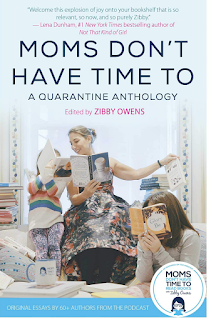
Let’s talk about your latest—Moms Don’t Have Time To: A Quarantine Anthology, that came about as a way to honor your loss (I’m so very sorry) of both your mother-in-law and grandmother-in-law from Covid, both in the space of six weeks. Being who you are, you are also generously donating all proceeds to Mt. Sinai for Covid vaccine research. I love the sections: Read. Workout. Eat. Have Sex. Breathe. There are more than sixty essays here! What was it like getting the essays, and how did you decide the format and what to include? I’m curious how you say no to people, because you seem like the person who always, always says YES.
First of all, you are just beyond sweet. I’m going to frame this introduction by my bed. Maybe it would help me sleep better - ha! Well, getting the essays was really fun. First I identified the categories I wanted to start with. Then I made a huge spreadsheet and started reaching out to authors to ask if they’d write for me, along with some ideas for them based on their books and/or our discussions on my podcast. For example, I would suggest an “eat” essay to someone who had confessed to an eating disorder in our interview. Then I worked with editors/authors Claire Gibson, Elissa Altman and then Carolyn Murnick to manage all the submissions and edit them. At first they all lived on my website under the We Found Time magazine umbrella, but after several months I realized: wait, a minute. This is a BOOK. And yes, there were some essays that might not have been necessary the right fit given their topic or whatever, but luckily I’ve just launched Moms Don’t Have Time to Write,a Medium publication, and am going back and publishing them there!
What is so remarkable about these essays is that they go beyond the Pandemic. By that, I mean that the issues in these essays speak to women’s lives always, connecting us around the issues that resonate for us, all about how we spend our time, and who we strive to become. The biggest message seems to be: we are a tribe. We can connect. We can help and support one another. Can you talk about that please?
Oh my gosh, I couldn’t agree more. Making people — especially women — feel less alone has been a big part of my mission from the start. I was crying on the bathroom floor one day about something kid-related (which was so unimportant in the big picture that I can’t even remember what it was) and I was like: there must be other women out there, crying on their bathroom floors. It’s why I write. Why I podcast. Why I’m doing this anthology — and the next one, coming out in November 2021!
You have said this wonderful quote:
I believe in the power of stories.
I believe in the healing power of a good conversation.
I believe that listening is far more important than speaking.
I believe that the right book can change everything.
Can you pick one of these beliefs and tell us your personal story about it? (I know, I know. I put you on the spot! Forgive me!)
Forgiven. But only because you promised me brownies. Let’s take listening. I grew up very shy and even went through a whole summer when I was 14 when I literally couldn’t speak at all. Yes, I could be myself around my friends and family, but in new situations, like going away on a language-immersion program, I literally couldn’t speak. So I spent the summer listening, analyzing language, marveling at how easy and effortless it seemed to be for everyone else to simple speak. I’ve always been an observer, watching, listening, before engaging. I love photography and am constantly snapping pictures, just like the snapshots of scenes in my mind that I end up writing about. Listening is powerful. I learn so much about other people. And then they end up really opening up to me. Because I’m legitimately interested. I really do care. I think people can tell.
I also loved the To-Do list you posted on the bookmarks you include, which really, every single reader should do for every book. Post a photo of the book. Order the book. Give copies as books. Leave a review. Consider buying in bulk and spread the word. And I recently received the most wonderful grab bag from your publicist with a jump-rope that I use now! How did you get so brilliant at promoting all the things you do? How did you figure it all out? (And readers, please do all of these things!)
Well, I’ve been doing my literary podcast for just under three years now and have been pitched books in all sorts of ways from a standard-issue publisher mailing to a hand-delivered package with a hand-written note. I’ve gotten scarves, luggage tags, CBD bath bombs, chocolates and, most recently, a Twix bar. I’ve seen what works and what doesn’t. I know how hard it is to stand out; I get pitched about 75-100 books each week now via email (preferable) or in the mail. Like I said before, I watch and observe. Also, I did have a mini-career in marketing/advertising a lifetime ago, working at a brand development and design firm in L.A., then at a big Internet incubator called idealab! and then for Unilever Prestige helping launch the Vera Wang fragrance, before going to Harvard Business School. So I do have some experience in marketing. But mostly, I can just put myself in someone’s else’s shoes and know what I would want — and then I do that!
You also have a two-book deal to write children’s book with Flamingo an imprint of Penguin Random House! Is this scary, exciting, what? And will you test-drive these books on your own kids?
Yes! The kids have already heard the first book and have gotten sneak peeks of the illustrations of two of the main characters! It’s a really fun process. Princess Charming is schedule for early Spring 2022.
What’s obsessing you now and why?
Honestly, I just got the coolest thing ever. It’s this object that on the outside looks and feels exactly like a book, but when you open it, it becomes a lamp. I put it on my bed as my husband sleeps and the kids delight in opening it up and illuminating their rooms. It’s just the coolest. It’s a total splurge item that no one actually needs, but aren’t those the best types of obsessions?
Thank you, Caroline!
@font-face {font-family:"Cambria Math"; panose-1:2 4 5 3 5 4 6 3 2 4; mso-font-charset:0; mso-generic-font-family:roman; mso-font-pitch:variable; mso-font-signature:-536870145 1107305727 0 0 415 0;}@font-face {font-family:Calibri; panose-1:2 15 5 2 2 2 4 3 2 4; mso-font-charset:0; mso-generic-font-family:swiss; mso-font-pitch:variable; mso-font-signature:-536859905 -1073732485 9 0 511 0;}p.MsoNormal, li.MsoNormal, div.MsoNormal {mso-style-unhide:no; mso-style-qformat:yes; mso-style-parent:""; margin:0in; mso-pagination:widow-orphan; font-size:12.0pt; font-family:"Times New Roman",serif; mso-fareast-font-family:"Times New Roman";}a:link, span.MsoHyperlink {mso-style-priority:99; mso-style-parent:""; color:#0563C1; text-decoration:underline; text-underline:single;}a:visited, span.MsoHyperlinkFollowed {mso-style-noshow:yes; mso-style-priority:99; color:#954F72; mso-themecolor:followedhyperlink; text-decoration:underline; text-underline:single;}.MsoChpDefault {mso-style-type:export-only; mso-default-props:yes; font-size:10.0pt; mso-ansi-font-size:10.0pt; mso-bidi-font-size:10.0pt; mso-fareast-font-family:Calibri;}div.WordSection1 {page:WordSection1;}
October 22, 2020
Elinor Lipman's RACHEL TO THE RESCUE is the perfect anti-Trump, pro-voting book you need right now
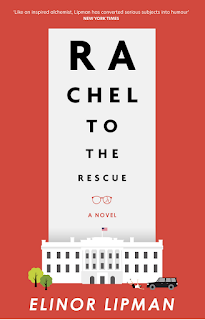
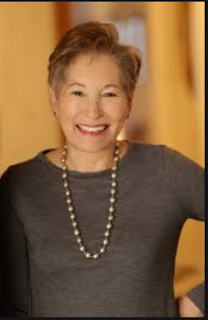 You've long been political, with hilarious tweets, and now you have a book. BUT how did you know about the department that tapes back everything Trump has torn up? It's a genius idea, and you ran with it. Can you tell us about the process?
You've long been political, with hilarious tweets, and now you have a book. BUT how did you know about the department that tapes back everything Trump has torn up? It's a genius idea, and you ran with it. Can you tell us about the process? I knew I wanted to write about someone with a short-lived job in the Trump administration, and one day I read about WHORM (White House Office of Records Management—truly its name) in Politico.com, and I said, “that’s it! That’s Rachel’s soon-to-be ex-job." I confirmed it with the actual archivist of the U.S. that it still exists, Scotch-taping the ripped-up documents all day long. A paragraph from Politico is the epigraph of the novel.
It's also incredibly smart (and hopeful!) that you bypassed the length of publishing to get this out there. What was that process like?
It was a slog, and one I wasn’t prepared for. I’d never had a book turned down, and my agent called it “delicious and relevant,” so I wasn’t worried. Ha! One by one, editors said exceedingly nice things along the lines of “has your usual warmth and wit, etc. etc.” all very complimentary, but to a person they were worried about Trump fatigue when 2021 rolled around. “No one will feel like laughing at Donald Trump” in a year when the book would come out. Jonathan the significant other said, “Won’t we be dancing on his grave forever?” Stacy Schiff, one of my first readers, said with each rejection,“I don’t get it! It’s a palliative.” Then dubbed it “The Trump Book That Could Only be Published Abroad.”
How can we all order this asap? http://eye-books.com/books/rachel-to-...
OR on the demon Amazon for those who have e-readers!
And anything else you would like to say? I am about to do another newsletter and I will put this in it, too!
Yes! At the same time I'm hearing about the U.S. rejections, Mary Trump’s book sold 980,000 copies in its first day for sale. And the NY Times’s Nicholas Kristof published an op-ed titled, “To Beat Trump, Mock Him.” Not in a novel, not in a year’s time, was the message. I did have this fond hope that England, where the diapered baby Trump blimp was invented, might not be afraid to get this out, and fast.
October 6, 2020
Can you thrive as an adult if you were mistreated as a child? You will want to read R. L. Maizes' novel OTHER PEOPLE'S PETS, and here she talks about relating better to animals than people, family and writing, and so much more!
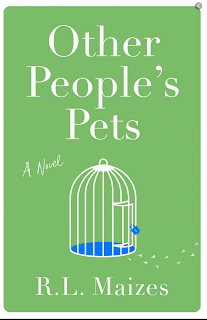
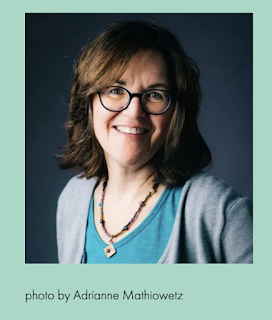
I am so thrilled to host R. L. Maizes and her incredible novel, OTHER PEOPLE’S PETS (Celadon Books, Macmillan). It was a Library Journal Best Debut of Summer/Fall 2020. She is the author of the short story collection WE LOVE ANDERSON COOPER (Celadon Books) and her stories have aired on National Public Radio, and can be found in Electric Literature’s Recommended Reading and in The Best Small Fictions 2020 (forthcoming). Her essays have been published in The New York Times, The Washington Post, and have aired on NPR.
Let's look at the dazzling praise:
"While reading R.L. Maizes' Other People's Pets, I could not stop saying, as La La mouths to herself at one point, remarkable. Every time the novel opened up yet again to reveal some new depth, much like La La and her ability to experience the emotions of the animals around her, I worried how the novel could hold such wonder without bursting, could control the pain and joy of this remarkable story. But Maizes possesses such magic. This examination of family, across all lines and definitions, will open you up in such necessary, beautiful ways."
―Kevin Wilson, author of Nothing to See Here and The Family Fang
One of Library Journal’s Best Debuts of Summer/Fall 2020
"'Other People’s Pets,' with its lively voice and unexpected characters, makes a perfect addition to anyone’s summer reading pile, but it is required for those who understand that coming of age has absolutely nothing to do with age." Full review here.
—The Washington Post
"This debut novel brings to life a wholly original, deeply charming, and seriously flawed character whose enormous heart leads her into a mess of trouble. A beguiling tale that will make readers want to leap into the pages...." Full review here.
―The Library Journal, STARRED Review
“With its powerful exploration of a dysfunctional birth family and the life that can be made from and despite the traumas of inheritance, Other People’s Pets is, quite simply, a great read.” Full review here.
—Washington Independent Review of Books
"While its quirky combination of fictional elements and adroit, deadpan writing give the novel a wryly comedic atmosphere, La La’s story is melancholy and moving. An uncanny, appealing blend of suspense, irony, tragedy, and how-to for lock-picking, burgling, and ankle monitor removal." Full review here.
―Kirkus Reviews
Maizes was born and raised in Queens, New York, and lives in Boulder County, CO, with her husband, Steve, and her muses: Arie, a cat who was dropped in the animal shelter’s night box like an overdue library book, and Rosie, a dog who spent her first year homeless in South Dakota and thinks Colorado is downright balmy.
Thank you so much!!!
I always want to know what was haunting an author when they write their books? So what was on your mind when you wrote Other People’s Pets (which I really really loved by the way)?
I was thinking about whether you could thrive as an adult if you were neglected as a child, and what that would take. I was also considering what animals give us and wondering what it would it feel like to experience animals’ physical and emotional sensations as the main character, La La, can.
I love the whole idea of relating to animals better than with people—but what I loved equally was that you created a heroine who steals from houses and we love her for it.
I’m so glad La La resonated with you as a character. I knew when I created a protagonist who was a burglar that one of the challenges would be to make her sympathetic. Not that all main characters have to be sympathetic. But I wanted her to be. It helps that she is loyal to her father and takes care of animals in the homes she robs, though both put her at great risk.
I am totally obsessed with family—especially how we escape the confines of the ones that we are born with and the ones we are able to make for ourselves? Can you talk about that please?
I’m so taken with the idea of found family. That we can create families as adults and choose who will be in them fills me with hope. We all have wounds that we carry because our parents and the way we grew up were less than perfect. Our ability as adults to create family out of friends and lovers and animals and through that to give ourselves some of what we missed as children is one of life’s gifts.
I cannot believe this is a debut because it just GLEAMS. What was it like for you writing this book? Do you plan these out? Or do you just wait for that pesky muse? And what lessons do you feel you’ve learned about writing that you will use in your next work?
Thank you so much. I wrote six days a week, so I definitely didn’t wait for the muse to show up. For the first messy draft, I worked without an outline, telling myself the story. Then I created an outline in which I fixed many of the problems that had arisen in the draft. I began a second draft with one eye on the outline. But I’m always listening to my characters, and if they want to stray from the outline, I follow them, and then revise the outline. That happened with each subsequent draft.
Writing the book taught me there’s no need to panic when problems arise in the text. (Which doesn’t mean I won’t when I write my next book. I probably will.) But I did see that most problems are less intractable than they appear at first. It may take a lot of revision. You may have to wait a bit for a solution to arise, but most problems have solutions.
What, beside the pandemic and the world political situation is obsessing you now and why?
I’m concerned with people sharing false information on the internet, intentionally and unintentionally. That affects the political situation and the pandemic, and even apart from those contexts, it can and does destroy people’s lives. We all need to ask ourselves before we repost, retweet, or share information: is this true? How do I know?
What question didn’t I ask that I should have?
What’s the best vegan ice cream you’ve found? Costco sells orange coconut creamsicles. Very little nutritional value, but you’ll never regret eating one.
Can you give a shout-out to another author and to an indie bookstore you love?
I love Clare Beams’ new novel, The Illness Lesson. The language and the story are fantastic.
It’s feminist, and it has magical birds. What more could you want?
The Boulder Book Store is a wonderful indie bookstore that gives tremendous support to writers through events and through the Radio Bookclub they produce with KGNU public radio.
<!-- /* Font Definitions */ @font-face {font-family:"Cambria Math"; panose-1:2 4 5 3 5 4 6 3 2 4; mso-font-charset:0; mso-generic-font-family:roman; mso-font-pitch:variable; mso-font-signature:-536870145 1107305727 0 0 415 0;} @font-face {font-family:Calibri; panose-1:2 15 5 2 2 2 4 3 2 4; mso-font-charset:0; mso-generic-font-family:swiss; mso-font-pitch:variable; mso-font-signature:-536859905 -1073732485 9 0 511 0;} /* Style Definitions */ p.MsoNormal, li.MsoNormal, div.MsoNormal {mso-style-unhide:no; mso-style-qformat:yes; mso-style-parent:""; margin:0in; mso-pagination:widow-orphan; font-size:12.0pt; font-family:"Times New Roman",serif; mso-fareast-font-family:Calibri;} .MsoChpDefault {mso-style-type:export-only; mso-default-props:yes; font-size:10.0pt; mso-ansi-font-size:10.0pt; mso-bidi-font-size:10.0pt; mso-fareast-font-family:Calibri;}size:8.5in 11.0in; margin:1.0in 1.0in 1.0in 1.25in; mso-header-margin:.5in; mso-footer-margin:.5in; mso-paper-source:0;} div.WordSection1 {page:WordSection1;}</style></p>
October 5, 2020
Women in the 1970s. An all male-college during the most turbulent times. Love, grief and family. Sarah McCraw Crow talks about THE WRONG KIND OF WOMAN, printing out and retyping drafts (a great writing tip, by the way), and so much more.
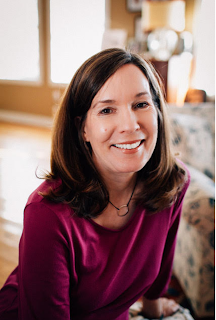
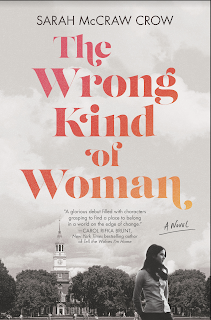
When I first read Sarah McCraw Crow's novel, THE WRONG KIND OF WOMAN, I immediately wrote a blurb for it. Here it is:
“How could I not devour a book set in my favorite era, the 1970s? About family, marriage, love and grief and a country in the turbulent flux of change, The Wrong Kind of Woman limns the lives of a stunned widow, her daughter and a lonely college student as they all struggle to come to terms with death—and life—against the backdrop of an all-male college during the Vietnam war, Kent State, the drug culture, and the first heady rise of the women’s movement. Absolutely fabulous.”
—Caroline Leavitt, New York Times bestselling author of Pictures of Youand Cruel Beautiful World
And I am not the only person entranced.
Publisher's Weekly says: “An entrancing debut” and “engrossing reading.” Also “Sarah McCraw Crow’s smart and thoughtful story will ring true to those who witnessed the social upheavals of the ’70s.”
And from Booklist, “readers will soar through the smoothly written prose and empathize with the strong characters. Suggest to those who loved Jennifer Weiner’s Mrs. Everything.”
SARAH McCRAW CROW’s articles, reviews, and short stories have run in many magazines and literary journals. She is a graduate of Dartmouth College, Stanford University, and Vermont College of Fine Arts. She lives on an old farm in New Hampshire with her family. Thank you so much for being on my blog, Sarah!
I love, love debuts. What’s it been like for you? What are the pluses as far as writing your second novel? Any minuses? Did you learn something new about you and your writing process as you were finishing the novel?
I love debut novels too! It’s thrilling but also feels a little strange that a book that I wrote is actually getting published. Also, I’m not the typical debut author, if there is such a thing—I’m 55, so I’m not exactly young and cute. I didn’t start writing fiction seriously until my early forties, when I took a novel-writing class at UCLA that you were teaching. Thank you for helping me get started! Many classes, two novels in the drawer, and one MFA program later, here I am!
As to the writing process, two tricks that helped me with revising were printing out and then retyping the whole draft, so I had to look at each sentence and each paragraph again as I typed. Also I read the whole draft aloud, which helped me hear those sentences that sounded clunky or ridiculous.
Regarding the second novel, yes, there have been pluses and minuses: On the one hand, as Brian Leung, one of my grad-school teachers, said about writing the second novel, “You did it once, so you know you can do it again.” I’ve found some confidence in that, which has kept me going.
On the other hand, and maybe this is also a reflection of the craziness of 2020, the pandemic, the Black Lives Matter movement, and terrible leadership at the top of our country, there have been many times this spring and summer when I’ve wondered whether my words have any meaning or use.
I always feel that writers are haunted into what they are writing. What was haunting you?
Haunted, yes, and by a couple of different things. I’ve always been interested in the women of my mom’s generation, and the choices they made, whether to go with the dominant culture or against it. My mom is progressive, but in the early Seventies, when she was busy with little kids and a medical-resident husband, she missed out on the women’s movement entirely.
I’m also haunted by the history of my own college, Dartmouth College, which the school in my novel, Clarendon College, is loosely based on. I wondered what it was like in the years before it went coed, when it was a lot like Animal House, and how it might have been for those who didn’t fit the mold of jockey WASP male. What if you were one of the few women faculty on campus back then? And what if you were a female exchange student among all those men who didn’t want you there—what would that have been like?
The Wrong Kind of Woman is told in three unique voices, that of a widow Virginia, her young daughter Rebecca, and college student Sam, each giving us a unique portrait of the process of grief, for both a family, and in a very real way, for a country in trouble. Can you talk about this please?
It's funny, because despite what I said before, when I started writing, I thought this was only a novel about grief, about three people getting through an untimely death. But as I watched Virginia’s journey, I saw that this story was about women—their place, or lack of it, on the Clarendon campus, and Virginia’s changing understanding of herself and the husband she’s lost—and also about a time, the late Sixties and early Seventies, when the country was pretty torn up.
By 1970, the Vietnam War had gone on for too long; Johnson had decided not to run again and Nixon had won the 1968 election. As the students kept protesting, the reactions got more heavy handed (as at Kent State). College campuses, and really the whole country, were in turmoil. And splinter groups like Weather Underground were setting bombs in public places. And the women’s movement was entering a new, more visible phase, beginning to push for the ERA and other changes.
I was really fascinated by the terrible way women were treated in academia. I’m not so sure it’s world’s better now. Is it?
That’s a good question. I’m not an academic, but it seems like it’s still tough for women in science to get the top jobs. Just last year, a group of women psychology grad students at Dartmouth won a settlement against the neuroscience department at Dartmouth for sexual harassment and sexual assault. That said, there are many, many more women in all areas of academia and college administrations than there were in the early Seventies.
So much of this amazing novel has got the 1970s spot on. What was your research like? What surprised you? Did anything surprise you so much that the plot veered?
Thank you! I love the Seventies, maybe because I was a little kid then. But the kinds of things that I remember from 1970—my Close ‘n Play record player, or TV shows like the Brady Bunch and Sesame Street—didn’t take me very far. So I read a lot of old newspapers, listened to late-Sixties music, looked at the books that were bestsellers. I also read accounts from women who were active in the women’s movement, and who’d joined anarchist movements like Weather Underground, and who were exchange students at all-male schools. Also, some readers of my early drafts happened to have been teens and college students in the late Sixties and early Seventies, and they noted when I got something wrong.
What’s obsessing you now and why?
I’m obsessed with a couple of things! One is an institute in the town where I grew up that promotes research into psychic phenomena—I’m curious about the people who founded it, and about its history more generally. I’m also kind of obsessed with the anti-nuclear weapons movement of the early Eighties.
What question didn’t I ask that I should have?
Well, it’s actually a question about you—how do you find the time not only to write your novels, but also to teach, read writers’ manuscripts, review books, and promote other authors here on your blog and for A Mighty Blaze? And I’d like to say thank you for all the good energy you put into other writers, as well as your own writing.
<!-- /* Font Definitions */ @font-face {font-family:"Cambria Math"; panose-1:2 4 5 3 5 4 6 3 2 4; mso-font-charset:0; mso-generic-font-family:roman; mso-font-pitch:variable; mso-font-signature:-536870145 1107305727 0 0 415 0;} @font-face {font-family:Calibri; panose-1:2 15 5 2 2 2 4 3 2 4; mso-font-charset:0; mso-generic-font-family:swiss; mso-font-pitch:variable; mso-font-signature:-536859905 -1073732485 9 0 511 0;} /* Style Definitions */ p.MsoNormal, li.MsoNormal, div.MsoNormal {mso-style-unhide:no; mso-style-qformat:yes; mso-style-parent:""; margin:0in; mso-pagination:widow-orphan; font-size:12.0pt; font-family:"Times New Roman",serif; mso-fareast-font-family:Calibri;} p.MsoFooter, li.MsoFooter, div.MsoFooter {mso-style-priority:99; mso-style-link:"Footer Char"; margin:0in; mso-pagination:widow-orphan; tab-stops:center 3.25in right 6.5in; font-size:12.0pt; font-family:"Times New Roman",serif; mso-fareast-font-family:Calibri;} span.FooterChar {mso-style-name:"Footer Char"; mso-style-priority:99; mso-style-unhide:no; mso-style-locked:yes; mso-style-link:Footer; mso-ansi-font-size:12.0pt; mso-bidi-font-size:12.0pt;} .MsoChpDefault {mso-style-type:export-only; mso-default-props:yes; font-size:10.0pt; mso-ansi-font-size:10.0pt; mso-bidi-font-size:10.0pt; mso-fareast-font-family:Calibri;}size:8.5in 11.0in; margin:1.0in 1.0in 1.0in 1.25in; mso-header-margin:.5in; mso-footer-margin:.5in; mso-paper-source:0;} div.WordSection1 {page:WordSection1;}</style></p>



